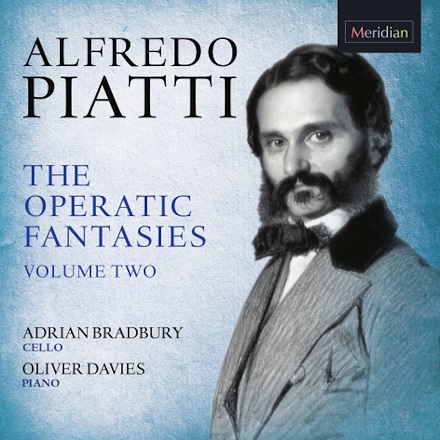So wrote the music critic of the Morning Post following a
performance by the Italian cellist, Carlo Alfredo Piatti, on 12 th July 1844, as part of the third of that year’s three matinée
concerts at the Hanover Square Rooms organised by the pianist Theodor
Döhler (and recalled by Morton Latham in his 1901 monograph Alfredo Piatti - A Sketch).
Piatti’s Operatic Fantasy on three numbers from Bellini’s penultimate opera
remained unpublished during his lifetime. It is one of three such fantasias
based upon themes by Bellini (La sonnambula and I puritani being the other two operas) that cellist Adrian
Bradbury and pianist Oliver Davies include on the first volume of Piatti’s Operatic Fantasies which was released on the Meridian label last year, and which has now been
followed by this second volume, thereby completing the set of twelve.
Born in Bergamo in 1822, Alfredo Piatti became one of the most renowned
cellists of the 19th century. His father was a violinist but the
5-year-old Piatti began learning the cello, under the tutelage of his
great-uncle, Zanetti, a music teacher and cellist of considerable
accomplishment. By the age of seven he was playing in the local opera
orchestra, and subsequently enrolled at the Milan Conservatoire where he
received lessons from Vincenzo Merighi until September 1837. A successful
performance at the Teatro della Scala in 1838 furnished him with sufficient
funds to undertake a European concert tour, earning acclaim in cities such
as Venice and Vienna.
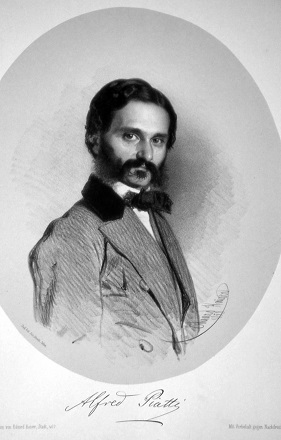 Alfredo Piatti (Lithograph by Eduard Kaiser, 1858)
Alfredo Piatti (Lithograph by Eduard Kaiser, 1858)
1843 found Piatti in Munich. He met Liszt who invited the cellist to share
a concert billing in Paris, gifting him an Amati cello upon learning that
financial pressures had forced Piatti to sell his cello and perform on
borrowed instruments. (Piatti later own the ‘Piatti’ Stradivarius.) He
travelled widely - to Berlin, Breslaw, Dresden, Paris and St Petersburg -
arriving in London in 1844, where the cellist who had spent his boyhood
playing in the opera orchestras of Bergamo, accompanying the finest bel
canto singers of the day, eventually becoming principal cello in Royal
Italian Opera at Covent Garden.
In London he became a distinguished and celebrated artist and teacher. (As
Wilhelm Joseph von Wasielweski explains in The Violoncello and its History, as Professor of Cello at the
Royal Academy of Music, Piatti taught many of the day’s finest cellists,
Hugo Becker, Robert Hausmann, William Edward Whitehouse, William Henry
Squire, Leo Stern and Edward Howell among them.) He became friends with
Mendelssohn, who wrote a concerto for him, as did Arthur Sullivan; he gave
the British premiere of Schumann’s Cello Concerto.
Piatti’s first private performance in London took place at the house of one
Dr Billing, then the medical adviser at the Opera, alongside the Italian
singers soprano Giulia Grisi and tenor Giovanni Battista Rubini. The London
public first enjoyed his playing on 31st May at the Annual Grand
Morning Concert given by Mrs Lucy Anderson, pianist to Queen Victoria, the Morning Post reporting: ‘Signor Piatti, a violoncello performer
from Milan, made a most successful debut. He played a fantasia on themes
from Lucia ... His style resembles that of Servais; and a clear
and liquid tone, with great equality all over the board, struck amateurs as
being particularly fine … his certainty and precision were unerring.’
Invited by Döhler to play at the first of the Hanover Square Rooms matinées
that year, Piatti gave a solo performance that prompted the critic of the Musical World to eulogise, ‘M. Piatti performed a violoncello
fantasia in which he displayed as great a command of this instrument as we
ever recollect to have heard’, and the Athenaeum reviewer to
observe that Piatti had ‘obviously formed his cantabile playing on that of
the singers of his own country’ - an astute comment, given that many
subsequent accounts of his playing noted that his cantabile playing offered
valuable lessons to vocalists.
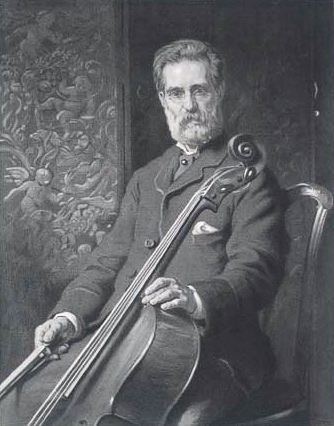 Alfredo Piatti (Frank Holl, 1871)
Alfredo Piatti (Frank Holl, 1871)
A month after his first public London debut, Piatti made his first
appearance at a concert of the Philharmonic Society, on 24th
June, following Mendelssohn’s performance of Beethoven’s Fourth Piano
Concerto with a Cello Fantasia by Friedrich August Kummer. A great
raconteur, later in his life Piatti recalled that this was the only time
that he heard an English audience call out ‘Bravo’ when he was mid-phrase!
The Morning Post praised his ‘magnificent violoncello playing
[which] won universal admiration … the perfection of his tone and his
evident command over all the intricacies of the instrument’, while the Times judged him ‘a masterly player on the violoncello. In tone,
which foreign artists generally want, he is equal to [English cellist
Robert] Lindley in his best days; his execution is rapid, diversified and
certain, and a false note never by any chance is to be heard.’
Piatti was one of the last cellists to play in the ‘old’ style, without an
endpin. A fine composer he enriched his instrument’s repertoire with two
concertos, a concertino, a Fantasia romantica and a Sérénade Italienne. He is best known today for his technically
demanding 12 Caprices Op.25, though he wrote sonatas, songs (some with
cello obbligato), themes and variations and other small works, and produced
important editions of 18th-century cello works by Locatelli,
Boccherini and Bach.
However, it was his fantasy compositions on operatic themes with which
Piatti launched his career and which so dazzled the salons and concert
halls of Europe, and it is these 12 Fantasias, many unknown and unheard
since performed by Piatti himself, that Adrian Bradbury and Oliver Davies
have ‘exhumed’ from the Piatti archives at the Biblioteca Musicale Gaetano
Donizetti in Bergamo, edited, performed, and now recorded in this
two-volume set.
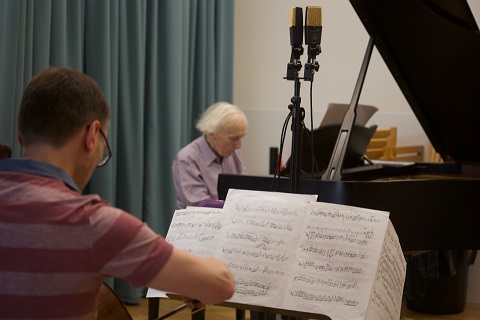 Adrian Bradbury and Oliver Davies recording ©️ Richard Hughes
Adrian Bradbury and Oliver Davies recording ©️ Richard Hughes
In conversation, I ask Adrian how this intriguing project had come about.
As a boy he had loved Piatti’s music, he explains - all young cellists know
and play the Caprices! - and when he was asked to perform at the Royal
Academy of Music’s 2011 celebration of their 100-year long residence at
their custom-built premises in Marylebone Road, whose music could be more
apt than that of Piatti, who for 25 years had been the Academy’s Professor
of Cello? Adrian recalls, as a child, hearing his father, clarinettist
Colin Bradbury, preparing for recordings of 19th-century
repertory with the pianist Oliver Davies, and having explored reviews of
Piatti’s playing, he asked Oliver to prepare a score of the unpublished
Fantasia on themes from Bellini’s Beatrice di Tenda, the autograph
manuscript of which was photographed and supplied by Dr Annalisa Barzanò,
co-author of Signor Piatti - Cellist, Composer, Avant-gardist
(2001), and musicologist at the Library G. Donizetti in Bergamo. Oliver
studied the cello solo, piano score and orchestral parts, and - taking into
account the evidence that they provided of Piatti’s revisions - was able to
piece together the jigsaw with considerable certainty. Alongside the Beatrice di Tenda Fantasia, at the RAM Adrian and Oliver also
performed the Fantasia on Bellini’s La sonnambula, one of the few
of the 12 that has been published. Enthusiastically received, the Fantasias
“really lived” through their songs, Adrian suggests.
Listening to Adrian and Oliver perform ‘Souvenir de Beatrice di Tenda’ (Volume One), I am struck by the way
Piatti fuses lyricism and drama, creating a sense that the melodic material
is evolving organically and inevitably. And, I’m sure the Morning Post critic would
be just as impressed by Adrian’s ability to sing with equal
persuasiveness through the extensive melodic phrases, the energetic
excursions to the cello’s stratosphere and depths, and the delicate
intricacies and ornaments, as he was when he
applauded Piatti’s ‘vanquishing’ of seemingly ‘insuperable’ difficulties -
I certainly heard pitches at a frequency that I don’t think I’ve heard from
a cello before, and beautifully sweet they were too! Moreover, there’s a
lovely spontaneity about Oliver’s and Adrian’s playing which seems to
conjure the excitement of the opera house and live performance. It’s
impossible not smile during the capricious episodes, or to be repeatedly
impressed at how such lighter moods segue with deceptive ease into sweet
sorrow, or troubled turmoil. Oliver’s interjections are perceptive and
sensitive, as if instruments in the pit were being coaxed in their turn to
emerge from supportive accompaniments and join the singer in melody.
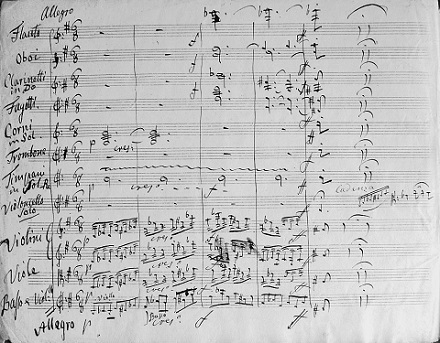 Autograph manuscript of Parafrasi sulk barcarola del Marino Faliero by Alfredo Piatti ©️Annalisa Barzanò
Autograph manuscript of Parafrasi sulk barcarola del Marino Faliero by Alfredo Piatti ©️Annalisa Barzanò
During the following decade, the duo set about preparing all twelve
Fantasias, and performing them regularly. Every few days, an email to
Annalisa would prompt the swift arrival of the next set of high-resolution
photographs in Adrian’s in-box. When he apologised for ‘bothering’ her so
regularly, Annalisa explained she had written her book primarily so that
Piatti’s music might be heard again. He will “never forget the buzz I felt
the first time that I downloaded the manuscript from my drop-box, printed
it and placed it on the music stand”. Oliver’s experience and knowledge of
the bel canto repertory enabled him to quickly identify the arias upon
which Piatti had drawn and as the prepared Fantasies grew in number, then
Artist By-Fellows at Churchill College, Cambridge, they gave performances
at the College.
Adrian and Oliver present the ‘Introduction et Variations sur un thème de Lucia di Lammermoor’ which so impressed the Morning Post reporter, in the second volume of Operatic Fantasies. This disc includes three other Fantasias on
operas by Donizetti, who had become a friend of Piatti’s father, Antonio,
whilst they were both studying with Simon Mayr in Bergamo. Piatti, who had
himself played in the Bergamo premiere of the opera in 1838, selected the
climactic closing aria, ‘Tu che a Dio spiegasti’, as his starting point,
preceding his fantasy on Edgardo’s grief-stricken plea that he might join
the dead Lucia in heaven, with an Andante Lento of his own.
The piano’s dark, tense opening resonates with the horrors and histories of
the cemetery in with Edgardo sings his lament, and Adrian captures both the
vulnerability and despair, tapering Piatti’s drooping phrases beautifully,
and the sudden, brief surges of pain and passion during which it seems as
if Edgardo’s heart will burst with anguish. Plunges and peaks, supported by
rumbling, oscillating octaves, sudden transmute from turbulence to
tenderness, as the cello theme voices Edgardo’s transfiguring memories of
Lucia’s purity and virtue. Adrian and Oliver persuasively guide the
listener through the unfolding variations with an effortless lyricism and
technical assurance: the cello’s double-stopped octaves and racing scales
of thirds are pinpoint-true, harmonics ring brightly and whisper softly,
the athletic demands are understated - but no less impressive - and the
melodising unwavering.
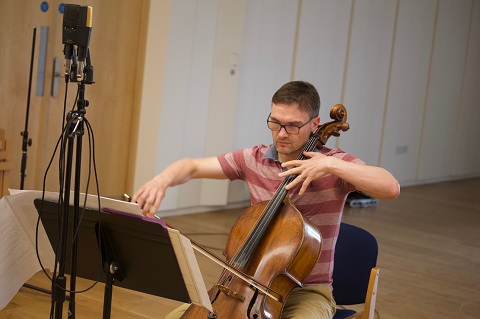 Adrian Bradbury ©️ Richard Hughes
Adrian Bradbury ©️ Richard Hughes
Why had this music languished unheard for so long? Adrian reflects upon the
reluctance of Piatti’s contemporaries to perform his music during his
lifetime: perhaps they were in awe of his virtuosity and wished to avoid
direct comparison? We discuss the subsequent waning of the popularity of
the fantasia form, and of the bel canto style itself. Perhaps the Fantasies
were just too closely associated with Piatti himself? Adrian draws
attention to one Francesco Berger (1834-1933), a
celebrated Professor of Piano at the RAM who invited many Italian refugees
to perform at his home, noting that ‘it was the fashion then for
performances of popular airs - an introduction, air and variation … how
strange now.’
Why were Piatti’s Fantasies so popular, I wonder? “It’s the opera in them,”
suggests Adrian, “one cannot separate bel canto from Piatti”. The Fantasies
“sparkle”, but they are notable not just for their virtuosity: their
musicianship is supreme. “All his life Piatti played this repertory. He
performed with Verdi’s wife, Giuseppina Strepponi, he shared a stage with
the finest singers of his day - Giuditta Pasta, Grisi, Rubini, Luigi
Lablache, Antonio Tamburini, Jenny Lind, Maria Malibran and Michael Balfe.
He wrote from the heart, but the ‘style’ is correct: the Fantasias are a
delight, but Piatti was not simply ‘dabbling’. They are not a vehicle for
virtuosity but, like the Caprices, works of real quality. The virtuosity
was taken for granted, it was the musicianship that Piatti put first.”
Whereas others cobbled together works which would showcase their skill and
dexterity, Piatti took composition seriously and continued studying to the
end of his life.
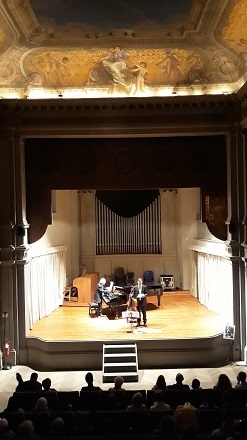 Adrian Bradbury and Oliver Davies performing in Sala Piatti, Bergamo
Adrian Bradbury and Oliver Davies performing in Sala Piatti, Bergamo
One can hear just what Adrian means when listening to the only Fantasy in
these two volumes which is not based upon the music of one of Piatti’s bel
canto contemporaries - the ‘Impromptu on an air by Purcell in the Indian Queen’. Piatti wonderfully captures the musical spirit of
the English composer, the precise rhythmic emphases that lend such a
distinctive quality to Purcell’s songs and airs, the smoothly evolving
melodies which Purcell - who might be described as the ‘creator’ of English
secular melody - modelled on the Italian style of expressive singing that
he studied and admired. But, Piatti integrates Italianate delicacies and
graces, the cello interrupting the piano’s simple first phrase with some elaborate flourishes
then tenderly duetting with the theme, first joining as one voice, then
stroking the line with curls, trills, flights. And, just when it seems that
the ground is shifting towards the Italian style, so Piatti shows one to
have been deceived. This is not just an example of Piatti’s compositional
skill but also of his remarkable ability to assimilate varied material.
Adrian’s and Oliver’s performance of Piatti’s stylistic sleights of hand is
utterly magical.
Adrian explains that Piatti’s personal experience is integral to these
works. The bel canto conductor Jeremy Silver advised Adrian that the
Fantasias are fascinating from a conductor’s perspective. “You can see it,
for example, in the articulation that Piatti marked in the Lucia
part: he uses a special articulation mark - a wavy line - a cantabile
indication which he placed over all the operatic phrases. It is to be
played ‘legato, almost separate’. It’s as if Piatti is imagining the
singers on stage beside him.” The decorative fioritura, the declamation of
the recitatives, cadenzas, cadences and ornaments: all are meticulously
indicated. “Piatti inhabits a bel canto ‘skin’ in order to communicate the
essence of the music.” Similarly, the fingering and portamenti are finely
marked. “Even in the Fantasias that were not published [six were published
by Ricordi and Schott]. Though he alone played them, we are sure Piatti was
always aiming for future publication.”
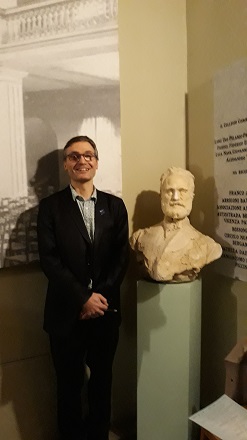 Adrian Bradbury next to bust of Alfredo Piatti, Sala Piatti, Bergamo
Adrian Bradbury next to bust of Alfredo Piatti, Sala Piatti, Bergamo
The bel canto spirit infuses every aspect of these Fantasias, Adrian
believes. He found himself listening to and learning from the singing of
Joan Sutherland, with regard to how to interpret the ornamentation. “The
cello bow becomes the diaphragm; the double-stopping becomes duetting. It must feel as if you are singing; if not, you are in trouble,” he
laughs. When the Royal Opera House presented Bellini’s La sonnambula in 2011, Oliver urged Adrian to see the production.
Admitting that he had not seen the opera before, Adrian tells me of the
tremendous impact that the solo arias, particularly the declamation, had
upon him. Hearing the familiar melodies, it was as if he was experiencing
them entirely anew, learning again and putting the tunes in context.
“String players must listen to singers, and bel canto singers most of all,
to learn to play cantabile.”
Adrian hopes that these recordings will lead to the Fantasias becoming
valuable and wonderful additions to the repertoire. “And we can’t wait to
be allowed to return to Bergamo - so devastated by Covid-19 - to hug the
Piatti scholars once more for sharing their manuscripts and to present more
of the Fantasias in the wonderful Sala Piatti, with the Frank Holl portrait
of Alfredo Piatti looking down at us - approvingly I pray!- from the side
of the concert hall.”
Claire Seymour
Adrian Bradbury (cello), Oliver Davies (piano)
Alfredo Piatti: The Operatic Fantasies
Volume One: Souvenir de Beatrice di Tenda*; Souvenir de La sonnambula, Op.5*; Souvenir des Puritani, Op.9*;
Capriccio sopra un tema della Niobe, Op.22; Fantasia sopra alcuni
motivi della Gemma di Vergy; Impromptu on an air by Purcell in the Indian Queen*
Volume Two: Introduction et Variations sur un thème de Lucia di Lammermoor, Op.2; Rondò sulla Favorita*;
Souvenir de l’opéra Linda di Chamounix, Op.13; Parafrasi sulla
Barcarola del Marino Faliero* Rimembranze del Trovatore, Op.21;
Capriccio sur des Airs de Balfe*
*world premiere recording
